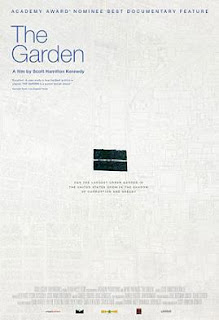The Garden

The three films nominated for Best Documentary at the last Oscars that I haven't seen have been released on DVD in the past few weeks, so I'll be reviewing them here over the next few days. The winner, Man on Wire, and Encounters at the End of the World were reviewed here earlier this spring.
I start with The Garden, which is about a subject that gets hard-core liberals all hot and bothered, but has nagging questions that can spoil the overall effect. It concerns a community garden that was established in South Central Los Angeles, and was farmed by the nearby residents, almost entirely Latino, over about a dozen years. Then the owner of the property wanted them off.
The director, Scott Hamilton Kennedy, does an admirable job on two fronts. One is that he sets this up as a real nail-biting thriller. The farmers organize, with two of their number, a man called Tezo and a woman named Rufina, as their leaders. They enlist a civil rights lawyer to fight off the notice of eviction, and if you have no idea of the outcome, as I didn't, the film plays out with real suspense.
I also appreciated that Kennedy doesn't ignore the basic problem facing the farmers: they don't own the land. It was owned by a businessman, who sold it to Los Angeles for about five million dollars, but then the city sold it back to him for about the same amount. The big mystery is why--the city council approved the sale in a closed-door meeting, and the film implies ever so gently that the black councilwoman, Jan Perry, and a community activist, Juanita Tate, had ulterior motives. Nothing is proved, of course.
Their are a lot of layers to this film, which was shot over three-and-a-half years. There's the "black vs. brown" aspect of a district that is represented by an African-American woman but is over seventy-percent Latino (many are undocumented, and thus can't vote). There's also the tension within the farmers, as Rufina evicts some of them for breaking rules (such as selling crops for profit) that leads to one taking a machete to another.
As outraged as one might get over this, though, there is the indisputable fact that they don't own the land. The owner, Ralph Horowitz, is something of a prick as, according to the film, he asks for 16 million, and when the farmer's raise it (with help from the Annenberg Foundation) he refuses to sell, so he may be a certifiable asshole. But he does own the land. And I never got the sense of what the garden meant to these people. Yes, they certainly cared passionately about it, but I don't think the film fully expressed what the stakes were. Several times we are told that it fed the community, but we don't really see any evidence of it. Aside from the nice thing of having a garden in an otherwise depressed urban setting, what reasons are there for abrogating the rules of private ownership?
Despite these concerns, I found the film gripping and heartbreaking, and a window into a strata of American population that is sorely under-represented in the media.


Comments
Post a Comment